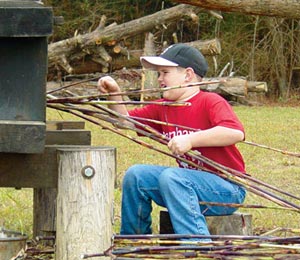Legacy Survives At Peinhardt Living History Farm

By the third-grade most kids know milk comes from a cow instead of a grocery store, and most can tell the difference between a chicken and a rooster. Alas, they certainly have no idea what sorghum is; they’ve never squealed on a hay ride; and few have known the thrill of sipping cold water from a big dipper stored at the well.The Peinhardt family of Cullman thinks that’s a real shame. So each year, they hold Farm Day for the general public at the Peinhardt Living History Farm in Cullman on land developed and worked by their family for 75 years.Today, the children of Carl Peinhardt operate about 40 acres of the family land as a foundation that focuses on teaching. Their mission: for visitors to realize that the barnyard and animals, the house and garden, the field, the woods and the animals all have an important purpose in helping the farmer make a living for himself and his family.Carolyn Peinhardt Johnson, Pat Peinhardt, Eddie Peinhardt and Dr Bill Peinhardt share the responsibilities of running and working the foundation, an effort of which Carolyn says she knows her parents, who died in the early ’90s, would approve.Daughter Carolyn says her parents would be thrilled with the foundation, and the fact the children are still involved with the farm and educating others. “I know they would love Farm Day, and I think they’re looking down and saying, ‘This is what we would do.’ They were always doing conservation work, and (hosting) judging teams for cattle and dairy, along with all the farming activities.”Since 1993, the Peinhardt Living History Farm has offered a comprehensive look at farming in the early ’30s and ’40s. It is funded by tax-deductible private donations and admission fees and is part of the Association for Living Historical Farms and Agricultural Museums.An 8,000-square-foot museum is just one of the teaching tools employed by the family and volunteers who will host Farm Day Saturdays, May 7, 14, 21, and 28. Demonstrations of farm life will be held among the log cabins, barns, exhibits and farm implements. There will be something for everyone, Carolyn says.The Peinhardt children, who now range in age from 59 to 69, grew up with farm chores. “It was hard work, but we managed to have a lot of fun, too,” Carolyn says. The family had cotton in the ’40s and always raised hay for the animals. There were cows and chickens and crops to take care of, too. “Until then we had to fork the hay onto a wagon, and the whole family worked to get it into the barn. Getting the baler was a really big deal in our family, and Eddie was put in charge,” Carolyn recalled. “We were milking 12 cows by hand, and the next big deal was the milking machine we got in about 1953. By the 70s, we were milking about 70 cows by machine. That was much better,” she added.Carl (1912-1992) and his wife Irene (Ehrensperger, 1917-1993) developed a registered Guernsey dairy herd as the main focus. Carl also was a carpenter, musician, rock mason and conservationist who stayed interested in agriculture all of his life, working on a pasture fence just two to three hours before he died.The Peinhardt legacy is one of hard work and dedication–carried forth by Carl and Irene’s children and the Peinhardt Living History Farm. To visit: Take I-65 Exit 308 in Cullman and follow the signs. Enter at museum on Talleyho Street. Farm Day hours are, 9 a.m. to 4 p.m., May 7, 14, 21 and 28. Admission is $5 for adults, $3 for children 6 years and older.Fran Sharp is a freelance writer in Alabaster and looking forward to Farm Day and pitching hay.
